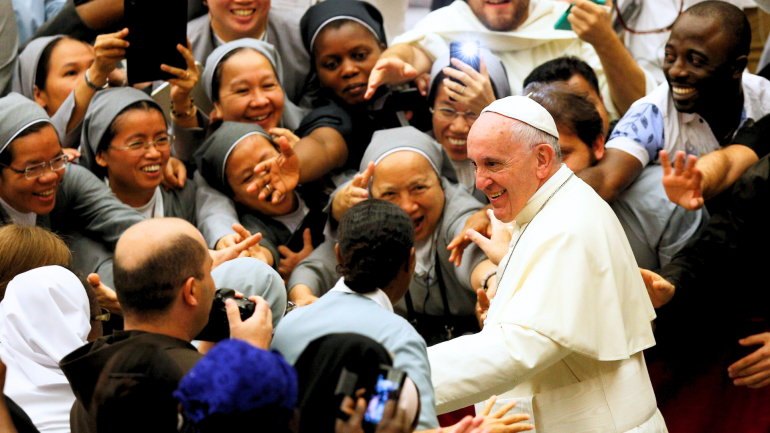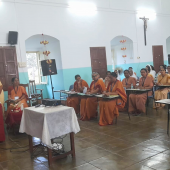Breaking Barriers: Women and the Francis Effect

One of the most admired world leaders of our time, dubbed “the parish priest of the world,” Pope Francis redefined the concept of the Church as a “field hospital,” giving love a tangible presence.
He raised the voices of the marginalized and canonized simple people from across the globe. His papal journeys and daily interactions captivated millions. Even those unfamiliar with Christ began to look at the Church anew because of his approach.
Francis was elected on March 13, 2013 — a day I remember vividly, as it was the eve of my birthday. At our convent in Delhi, we were preparing for a trip to the Taj Mahal the next day. Watching the rather elderly Francis step onto the balcony on live TV—still seemingly unsure of his election and bowing his head to the world to ask for prayers—I was reminded of an English film about the election of Pope John XXIII. Francis was the first Latin American pope and the first Jesuit pope. I liked the fact that he spoke Spanish. Since the official language of our congregation is Spanish, I felt an immediate closeness to him.
Over time, his actions deeply moved the world. He did things no pope before him had dared. We saw him as a loving father and a firm but compassionate teacher. In a church known for tradition, he made bold and transformative decisions. His desire to make everything available for everyone revealed a deep pastoral sensitivity.
Pope Francis brought about changes previously unseen in Church history. His ever-present smile and tender embrace of the sick — even those with disfigured conditions — reminded us of Christ. He embraced all, delighted in the playful mischief of children, and accepted divorced individuals and LGBTQ individuals with mercy and openness. He loved people unconditionally, welcomed sinners with compassion, cherished nature, and washed the feet of prisoners and the sick. He publicly sought forgiveness for the Church’s past wrongs and stood up for victims of abuse. Like his namesake, St. Francis of Assisi, he bore witness to a Christlike life — a living example of the Gospel. For 12 years, he served as a true shepherd and ambassador of love — breaking down barriers of race, religion, and language and promoting the dignity of every human being.
Pope Francis and Women in the Church
It’s no secret that the Catholic Church has lagged in offering women representation in leadership. Women have long had to struggle for their place — working tirelessly just to be seen. Even today, women’s voices in decision-making in the Church remain limited. Pope Francis, however, deserves special credit for initiating reforms to raise the status of women within the Church.
His death brought sorrow and a new fear — would women’s growing role in the Church now be stifled?
For centuries, women in the Church have served as helpers in ministry, sacristans, and cleaners — often with no recognition or formal representation. Even those leading their religious congregations had little voice in ecclesial governance. Until Pope Francis, women were largely absent from positions of Church leadership. His papacy changed that. He shattered the notion that the Church is for men alone. Over his 12-year pontificate, he appointed women to roles in which they had real authority, something never before seen in Church history. He called women’s intuition indispensable to both church and society. He saw the need for women’s leadership, and he gave them space. He insisted that the Church give women the importance it gives to Mary.
In 2015, he ended the tradition of washing only men’s feet on Holy Thursday. From then on, women, the sick, and prisoners were also included — a powerful symbol of the Church’s universality. On March 28, 2024, Holy Thursday, he again washed the feet of incarcerated women—defying outdated customs. Yet many parishes still haven’t followed his example, which is saddening.
A Church Where Women Have a Place
In major church events, bishops and clergy often receive reserved seating. Occasionally, laymen do. But religious sisters and women are typically left out or seated symbolically. Pope Francis, however, changed this. At a 2019 global gathering of women religious superiors in Rome — representing over 600,000 sisters — Pope Francis personally invited Sr. Carmen Sammut, then president of the International Union of Superiors General (UISG), to sit beside him.
Saints do ordinary things extraordinarily well — as Don Bosco once said.
Women in Church Leadership
While some parishes still resist including women even in parish councils, Pope Francis opened doors at the highest levels:
-
In 2016, he appointed Barbara Jatta—the first woman director of the Vatican Museums.
-
In February 2021, he named Sr. Nathalie Becquart as Undersecretary of the Synod of Bishops.
-
In 2022, Sr. Alessandra Smerilli became Secretary of the Dicastery for Promoting Integral Human Development.
-
That same year, Pope Francis revised the Vatican’s constitution, allowing laypersons and women to lead Vatican departments.
-
On January 6, 2025, he appointed Sr. Simona Brambilla, of the Consolata Missionary Sisters, as Prefect of the Dicastery for Institutes of Consecrated Life and Societies of Apostolic Life — the first woman ever to oversee religious life at that level.
-
On March 1, 2025, Sr. Raffaella Petrini, of the Franciscan Sisters of the Eucharist, was installed as Secretary General of the Vatican City State, second only to the Cardinal Governor — overseeing governance, infrastructure, and cultural heritage.
Francis embodied his beliefs. Despite advocating for a poor church, Pope Francis led a life marked by simplicity and devotion. In a break with tradition, he requested not to be buried in St. Peter’s Basilica but in the Basilica of St. Mary Major, where he often prayed to Our Lady.
May the soul of our beloved Pope Francis — a father in love, mercy, joy, justice, and humility — rest in the peace of the Triune God.
(Robancy A. Helen, a religious nun belonging to the Order of the Messengers of Mary of Magnificat (MMM), holds a doctorate in translation. She is a writer, freelance journalist, teacher, and translator. She contributes articles to various Catholic journals in India and abroad.)
Radio Veritas Asia (RVA), a media platform of the Catholic Church, aims to share Christ. RVA started in 1969 as a continental Catholic radio station to serve Asian countries in their respective local language, thus earning the tag “the Voice of Asian Christianity.” Responding to the emerging context, RVA embraced media platforms to connect with the global Asian audience via its 21 language websites and various social media platforms.














